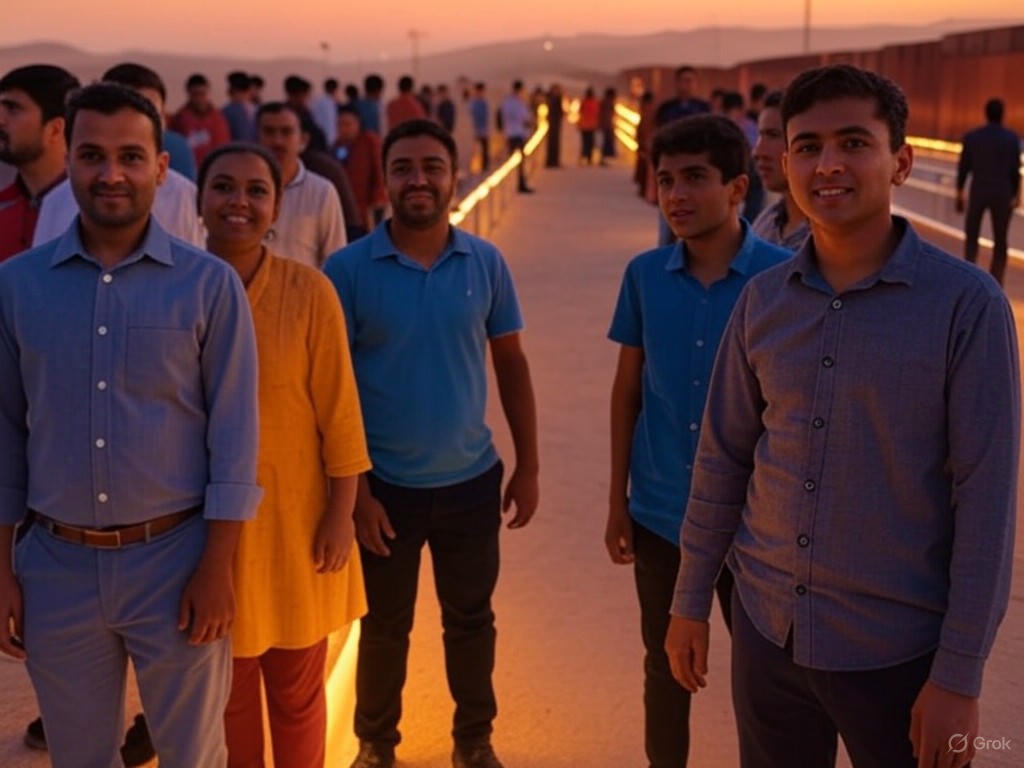
Global Updates: Attari-Wagah Border Shut, Mike Waltz Leaving White House
The Escalation of Attari-Wagah Border Closure: A Deep Dive into India-Pakistan Tensions
The Attari-Wagah border closure has thrust India and Pakistan into a new phase of diplomatic strife, highlighting the fragility of peace in South Asia. As of May 1, 2025, this complete shutdown stems from a devastating terrorist attack in Pahalgam on April 22, which claimed 26 lives and ignited accusations of cross-border involvement. Have you ever wondered how a single event can ripple into such widespread disruption?
This closure isn’t just about politics; it’s affecting everyday people, with Pakistani nationals stranded and facing uncertainty. Eyewitness accounts describe chaotic scenes at the border, where frustration boiled over into arguments and even physical altercations, underscoring the human cost of these decisions. In the midst of this, the Attari-Wagah border closure serves as a stark reminder of how quickly regional stability can unravel.
Mass Exodus and Stranded Lives Amid the Attari-Wagah Border Closure
Before the full shutdown, a wave of departures saw over 1,000 Pakistanis, including diplomats, leave India through the Attari-Wagah crossing in just a week. On Wednesday alone, 125 individuals crossed, but by Thursday, the gates were sealed tight, leaving more than 40 people in limbo. Imagine planning a trip home only to be told the door is shut—what would you do in that situation?
Indian authorities had amended directives to allow exits via the Integrated Check Post, but Pakistan’s refusal to cooperate meant no one could pass. This Attari-Wagah border closure has created a humanitarian crisis, with stranded citizens from both sides unable to reunite with their families. It’s a poignant example of how diplomatic spats can turn personal dreams into nightmares.
Timeline of the Diplomatic Crisis Leading to Attari-Wagah Border Closure
The path to the Attari-Wagah border closure began on April 23, 2025, right after the Pahalgam attack, which India attributes to Pakistan’s networks. This event triggered a cascade of retaliatory measures, escalating tensions between two nuclear neighbors. What might this mean for global security moving forward?
India’s initial response included suspending the Indus Waters Treaty and imposing travel bans, while Pakistan countered with airspace closures and trade suspensions. Despite these moves, the Kartarpur Corridor for Sikh pilgrims remains open, offering a glimmer of hope amidst the conflict.
Initial Actions and Countermeasures in the Attari-Wagah Crisis
India’s Foreign Secretary announced key steps like expelling Pakistani advisers and reducing embassy staff, all in response to the perceived threat. Pakistan didn’t hold back, suspending visas for Indians and even the historic Simla Agreement. The Attari-Wagah border closure is a direct outcome, symbolizing the breakdown in dialogue.
Terrorism allegations have fueled the fire, with India presenting evidence of links to global attacks. Pakistan’s defense minister’s remarks on past support for militants have only added fuel, making this more than just a bilateral issue—it’s a call for international intervention.
Current Realities at the Attari-Wagah Border
As things stand, the border is fully closed, with no crossings allowed, leaving hundreds in a state of uncertainty. Before this escalation, 152 Indian nationals and 73 Pakistanis with valid visas had managed to cross. Now, the Attari-Wagah border closure has frozen all movement, raising questions about when normality might return.
This situation echoes past conflicts, where water disputes and terrorism claims have led to standoffs. For those affected, it’s not just about politics; it’s about basic needs like food and shelter while they wait.
Shakeup in the Trump Administration: Mike Waltz’s Departure
Shifting gears to Washington, the Attari-Wagah border closure isn’t the only global headline—National Security Adviser Mike Waltz is leaving the Trump administration, marking the first big change in this term. This news comes amid controversies over handling sensitive operations, adding another layer of uncertainty to U.S. foreign policy.
Waltz’s exit follows criticism for including a journalist in a private chat about a Yemen military operation, raising red flags on security protocols. Influential figures like Laura Loomer have pushed for these changes, questioning loyalty to Trump’s agenda. How does this impact America’s role in crises like the one at the Attari-Wagah border?
Controversies and Expected Changes After Waltz’s Resignation
His deputy, Alex Wong, is also set to go, potentially disrupting the National Security Council at a time when global tensions are high. President Trump had aimed for a smoother second term, but this departure hints at the same instability seen before. The Attari-Wagah border closure abroad only amplifies the need for steady leadership here.
With conflicts raging in Ukraine and the Middle East, Waltz’s role was crucial. Now, as the administration searches for a replacement, we might see shifts that affect how the U.S. engages with allies and adversaries alike.
Global Implications: Analyzing the Attari-Wagah Border Closure and Beyond
The Attari-Wagah border closure fits into a pattern of India-Pakistan escalations, where water rights and terrorism fuel ongoing distrust. This could lead to broader instability, especially if military actions follow. Ever thought about how one border dispute could influence the entire region?
In the U.S., Waltz’s departure raises concerns about information security and political influences. Together, these events underscore the interconnectedness of global affairs, where a closure in Asia echoes in Washington.
Humanitarian Fallout from the Attari-Wagah Border Shutdown
At the heart of this are the people—stranded Pakistani nationals seeking medical care or visiting family, now stuck in India. Reports of over 40 individuals waiting at the border paint a picture of desperation. As detailed in Hindustan Times, this humanitarian crisis demands immediate action.
Indian citizens in Pakistan face similar woes, though details are scarce. If you’re following this story, consider how we can advocate for those caught in the crossfire.
Looking Ahead: Potential Paths and Humanitarian Strategies
Moving forward, the Attari-Wagah border closure could either de-escalate through diplomacy or worsen, potentially leading to military mobilizations. International bodies like the UN might step in to mediate, ensuring safe passages for civilians.
For individuals affected, practical steps include seeking aid from embassies or NGOs. Here’s a tip: If you’re traveling to tense regions, always have a backup plan for emergencies. What strategies do you use to stay safe abroad?
Wrapping Up: Calls for Resolution and Action
The Attari-Wagah border closure and Mike Waltz’s departure highlight the volatility of our world today. These events call for measured diplomacy to protect innocent lives and maintain global security. I’d love to hear your thoughts—how do you think this will play out?
If you’re passionate about international affairs, share this article or explore more on our site. Let’s keep the conversation going and push for peaceful solutions.
References
1. NDTV. “Attari-Wagah Border Closed Amid India-Pakistan Tensions.” Link
2. YouTube Video. “Wagah Border Ceremony Insights.” Link
3. The Indian Express. “Attari-Wagah Border Gates Closed Post Attack.” Link
4. Hindustan Times. “Complete Shutdown at Attari-Wagah.” Link
5. Wikipedia. “2025 India-Pakistan Diplomatic Crisis.” Link
6. PBS NewsHour. “Mike Waltz Exits Trump Administration.” Link
7. Open Science Framework. “Related Study.” Link
8. Economic Times. “Border Closure Details.” Link
Attari-Wagah border closure, India-Pakistan diplomatic crisis, Pahalgam terror attack, Mike Waltz resignation, Trump administration shakeup, Pakistan nationals stranded, global security implications, humanitarian border crisis, U.S. foreign policy changes, regional tensions escalation







